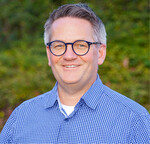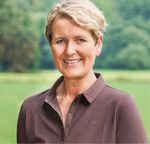The most important building block is high-quality raw materials
Kleeschulte Erden has been developing, producing and marketing peat-reduced and peat-free soils for more than 30 years, and thus not only driven by current political requirements and social trends. In this respect, the company is a particularly interesting contact for questions relating to the production of substrates.
- Published on

DEGA GARTENBAU: The number one topic everywhere at the moment is the exploding costs for energy, but also for other operating resources. How do you experience the situation for your company and how do you deal with it?
Jens Brune: The most important component of our peat-free and peat-reduced soils and substrates is our wood fiber Topora. This is made from wood chips produced in the sawmills in our region.
Mariel Kleeschulte: "The skyrocketing prices are getting to us, we have never calculated and calculated as much as in the last few months! Despite rising prices, wood fiber is a highly attractive raw material compared to other peat substitutes such as coconut, also in terms of price.
Jens Brune: The fertilizer bottlenecks are currently coming to a head. It is almost impossible to get hold of phosphate. We have stocked up early to be able to deliver in the coming season.
How do you see prices developing in the coming months?
Mariel Kleeschulte: We expect prices for raw materials, energy and fertilizer to remain high.
How do you experience the ordering behavior of customers for soils and substrates in the current difficult situation?
Jens Brune: Wait-and-see in the specialist trade sector, but confident and optimistic that the situation will develop in a good direction. Sustainability is and remains a megatrend in the garden, and with our soils and substrates we are ideally positioned in this respect.
Mariel Kleeschulte: Yes, and most certainly in times of rising food prices people will grow their own vegetables, and for that you need potting soil.
In the meantime, the phasing out of peat is a political goal for both hobby soils and professional substrates. Every manufacturer is adapting to this and looking for alternatives. In your company, you have been dealing with peat alternatives for a long time and in detail. What milestones have been particularly important for you over the years?
Mariel Kleeschulte: We set out early on to produce potting soils and substrates from peat substitutes. That was a huge challenge because there was simply a lack of experience in the industry and there was no technology, but it's also incredibly fun to show that it works. In 2007, we started up our first wood fiber plant. Today, we also build wood fiber plants for other soil manufacturers.
Jens Brune: In 2018, we presented our world innovation Topora Aqua at IPM. This wood fiber has a very fine structure and a water storage capacity like coconut. Topora Aqua is a real milestone for a high-quality peat-free soil.
Mariel Kleeschulte: "We are very proud of this development. After all, the ideas don't stop with us; in 2020 we launched our Paper Bag and in 2022 our first climate-positive potting soil.
You also offer substrates with 95% peat substitutes. That sounds great at first with a view to the target of phasing out peat. In what order of magnitude do you sell such very peat-reduced substrates? Can you name crops for which, in your customers' experience, such highly peat-reduced substrates are preferred?
Jens Brune: We use an average of 95% peat substitute in our mixes (the industry average is 42%). We offer peat-free substrates for professional horticulture. Our main professional substrates contain at least 50% peat substitute. There is no mixture in our range that does not contain at least 30 % peat substitutes.
Mariel Kleeschulte: Currently, the demand for peat-free substrates is rising sharply. We also attribute this to the projects currently underway, such as TerZ and TerÖko, in which practitioners are involved in an exemplary manner.
Jens Brune: Outstanding results can be seen in the area of classic bedding and balcony crops. In direct comparison, you often see much healthier root growth and thus a more compact habit of the plant.
Mariel Kleeschulte: "We are of course pleased that the official project results confirm our experience. This increases the acceptance for the strongly peat-reduced substrates.
A few years ago, you had the carbon footprint of your soils and substrates determined. Is this information used and appreciated by your customers?
Mariel Kleeschulte: Yes, the interest is huge. Back in 2014, we were the first soil plant to determine the carbon footprint of our soils and substrates and also display the values on the packaging. That was a completely new approach in the industry. We really invested a lot of time and money in this. When we develop new blends today, we always use our CO 2 calculator to see how high the CO 2 relevance is.
Jens Brune: We are seeing very strong interest in the specialist garden trade, but there is also increasing demand in the professional sector. The goal of horticultural businesses is climate-neutral production. The lower the carbon footprint of the substrate, the faster this goal is achieved.
This year, your company added the Gemeinwohlökonomie certification. Can you briefly say what this is all about and why you are going down this path?
Mariel Kleeschulte: With pleasure! To put it in a nutshell: We cannot continue to operate on this earth as we have in the past. We have to move toward greater sustainability in terms of resource conservation, climate protection and social aspects. We are already doing a lot of this in our company, and it has always been important to us to combine ecological and economic goals. Ultimately, sustainability became an innovation driver for us! The common good economy makes this commitment measurable, which immediately excited us. I am convinced that in the future a comparable certification will become quite normal. Anyone who would like to know more is welcome to get in touch.
With regard to environmentally conscious consumers, there are now many potting soils for hobby gardeners that are heavily or completely peat-reduced. However, they are buying into previously unfamiliar challenges with it, to name a strong odor, fungus gnats and a more difficult supply of nutrients. What are you doing to ensure that hobby gardeners don't lose their enjoyment of plants, especially indoors?
Jens Brune: We benefit from over 35 years of experience in the field of peat-reduced soils and substrates. The most important building blocks are high-quality raw materials in the appropriate formulation and coordinated nutrient additions. We produce the majority of our raw materials such as wood fiber and bark humus ourselves; for example, our bark humus undergoes a nine-month maturing process. We pay very close attention to this. We only use green waste compost. We are convinced that we do not use questionable raw materials such as sewage sludge and fermentation residues.
Mariel Kleeschulte: Yes, there is a lot of know-how involved. You learn from your mistakes, and over the years our soils have become better and better. Today, we are already specialists in this field.
Jens Brune: That's right, and that's why we are perfectly prepared for the next step: We are gradually converting our entire Kleeschulte Hobby line to 100% peat-free!



